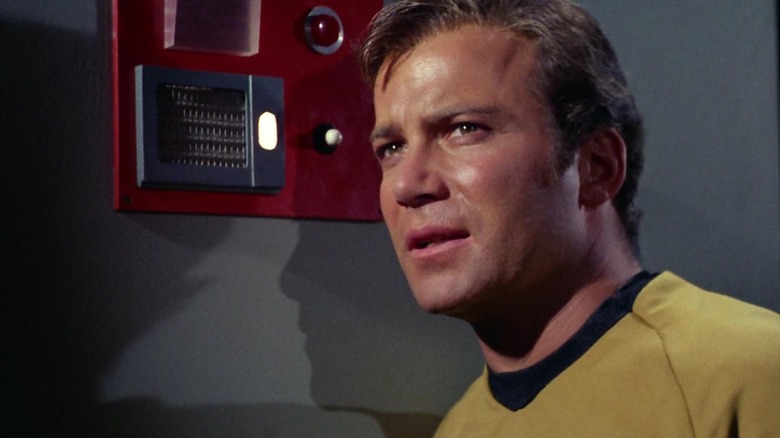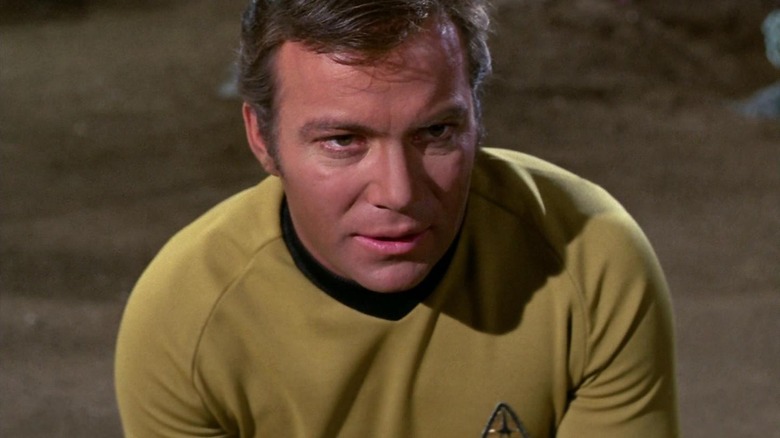How William Shatner Responded To Star Trek's Cult Status 5 Years After The Show Was Canceled
We may receive a commission on purchases made from links.
As any Trekkie can tell you, "Star Trek" wasn't terrifically popular during its initial run. The series' fans were passionate but frustratingly scant, keeping its ratings low. "Star Trek" was originally set to be canceled after its second season, but a concerted letter-writing campaign kept it on the air for one more season before it ended in 1969. It then sauntered off into the night, and show creator Gene Roddenberry moved on to other things.
Luckily, that third season gave "Star Trek" enough raw volume (the show ran for 79 episodes total) that it could land a few sweet, long-term syndication deals. As a result, "Star Trek" was re-run incessantly into the early 1970s, allowing new audiences to discover the series and old audiences to become obsessed. VCRs weren't yet common in the early 1970s, but the show's ubiquity on TV allowed fans to memorize the tiniest details. It wouldn't take too long for "Star Trek" to become a cult hit. The first official "Star Trek" convention was then held in New York in 1972. From then on, the franchise was firmly entrenched in the pop consciousness in perpetuity.
Way back in 1975, however, the stars of "Star Trek" were facing a still-changing pop media landscape. Their show had been canceled, but, thanks to the reruns and the conventions, they were becoming celebrities. William Shatner, who played the boldly decisive Captain Kirk on the series, even appeared on Geraldo Rivera's interview program "Good Night America" in '75 to talk about the popularity of "Star Trek" and what it was like to meet obsessive fans. More than anything, Shatner was baffled by the phenomenon. Fans, he explained, could recite lines from "Star Trek" that he had forgotten years before. Why, Shatner wondered, were people still interested? He couldn't figure it out.
And, no, he never seriously yelled at "Star Trek" fans to get a life. In the 1975 interview, he seemed very complimentary to the Trekkies in attendance.
Shatner tried to bring humanity to the commercialization of Star Trek
Shatner's interview with Rivera came after the actor had just recently appeared at a "Star Trek" convention in New York, an event that attracted 10,000 people. Shatner noted that it was the largest crowd he had ever performed for, much larger than a 5,000-seat Central Park variety show he hosted a few years earlier. He said that he was about to speak at a 10,000-person convention ... and that he had no prepared material. He would have to be extemporaneous. Shatner knew that a free-floating analysis of "Star Trek" wouldn't fly, as the fans knew the series better than he did. The actor had to think up an approach to "Star Trek" that would carry the room. As he put it:
"The night before I went on, I thought, 'What can I tell these people — who know the scripts and the characters and the inner [motivations] far more than I ever did. [...] And I have no recollection! What can I tell them? The only thing they don't know, that I know, are some of the little things. How I felt about a particular incident. My view on a certain thing. So, I thought what I'd do is cut through all the malarkey and all the falderal that unfortunately surrounds the show, because so many people are making so much money from the merchandise. I tried to cut through all that."
Shatner, it seems, wanted to add an element of humanity to the commercialization of "Star Trek" he clearly disapproved of. As such, he felt his own perspective on the experience of making "Star Trek" was the only thing of value he had after the show's cancellation.
Shatner took that philosophy with him for decades, authoring multiple autobiographies (including "Star Trek Memories" and "Star Trek Movie Memories") and continuing to appear at conventions to this very day. Shatner, now 94, still tells anecdotes but also speaks openly about his life, which he is still bursting with. He may even play Kirk again.
One might wonder if he's still baffled at the show's continued popularity.

